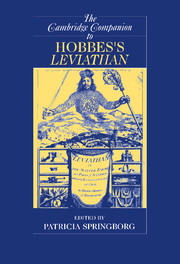Book contents
- Frontmatter
- General Introduction
- Part I: Of Man
- Part II: Of Commonwealth
- 6 Hobbes on Persons, Authors and Representatives
- 7 Hobbes on Glory and Civil Strife
- 8 Hobbes and the Philosophical Sources of Liberalism
- 9 Hobbes on the Right to Punish
- Part III: Of a Christian Commonwealth
- Part IV: Of the Kingdom of Darkness
- Part V: Hobbes’s Reception
- Bibliography
- Index
- Series List
8 - Hobbes and the Philosophical Sources of Liberalism
from Part II: - Of Commonwealth
Published online by Cambridge University Press: 28 November 2007
- Frontmatter
- General Introduction
- Part I: Of Man
- Part II: Of Commonwealth
- 6 Hobbes on Persons, Authors and Representatives
- 7 Hobbes on Glory and Civil Strife
- 8 Hobbes and the Philosophical Sources of Liberalism
- 9 Hobbes on the Right to Punish
- Part III: Of a Christian Commonwealth
- Part IV: Of the Kingdom of Darkness
- Part V: Hobbes’s Reception
- Bibliography
- Index
- Series List
Summary
Hobbes's political thought has often been considered one of the sources of liberalism and Leo Strauss takes his place among famous advocates of this claim. According to him, 'Hobbes was the true founding father in liberalism' because his thought is characterized by two basic assertions: (1) that the fundamental moral fact is the existence of the rights of man, instead of an original duty; and (2) that the office of the state is to preserve natural right in the person of each individual, rather than 'creating or promoting a virtuous existence in humankind'. Moreover, to the extent that a delightful and comfortable life is substituted for the 'good life' as the goal of social existence, Hobbes is not only a founder of liberalism but also of modernity as such.
The Straussian strategy of interpretation takes up one of the crucial points of Hobbes's thought; indeed, the obligation of self-preservation appears to be the sole primary obligation that is acknowledged by natural liberty when it is fully and boundlessly experienced in the state of nature. If there is something like a primary duty it is only towards oneself, to promote one's self-interest, and this duty is immediately translated into a right: 'the RIGHT OF NATURE . . . is the liberty each man hath to use his own power, as he will himself, for the preservation of his own nature, that is to say, of his own life'. But exercising this right in the state of nature is done at the expense of prejudicing the self-interest of others.
- Type
- Chapter
- Information
- The Cambridge Companion to Hobbes's Leviathan , pp. 199 - 216Publisher: Cambridge University PressPrint publication year: 2007
- 16
- Cited by

